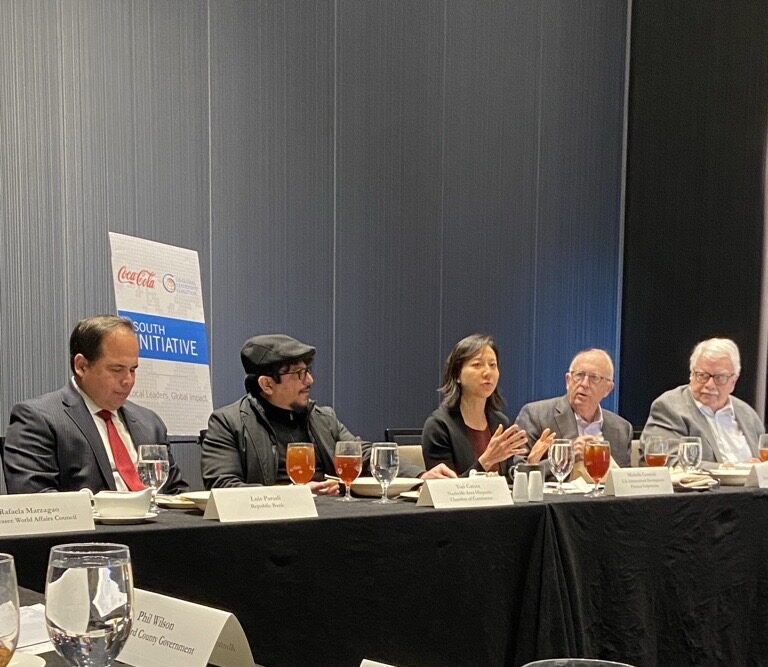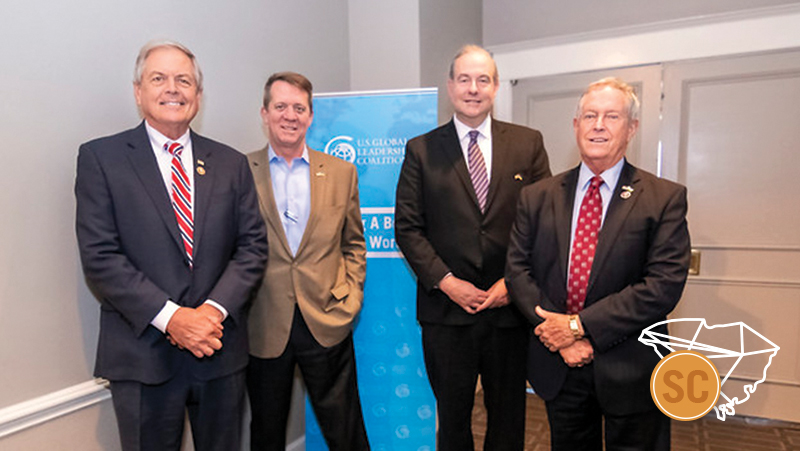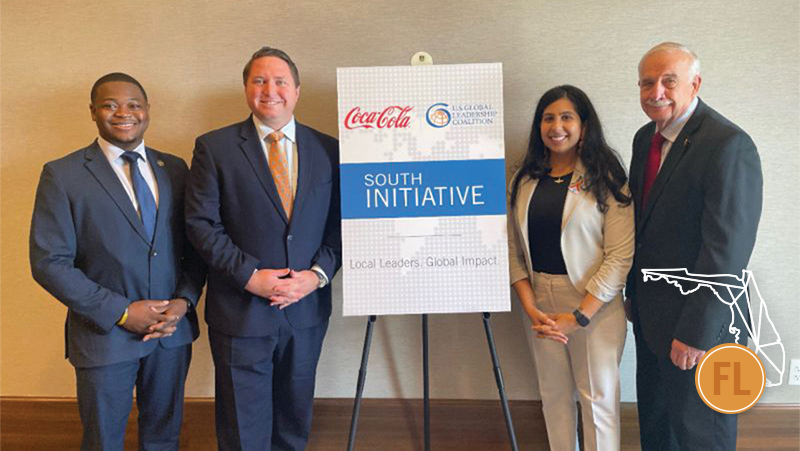
Rising global threats challenge America’s values and global leadership every day – a fact that Congressman Gerry Connolly (D-VA-11) understands all too well. As a former Senate Appropriations staffer and current leader on the House Committee on Foreign Affairs, Congressman Connolly spoke to leaders in Fairfax County, VA about the risks we face if America retreats from the global stage and allows our adversaries to undermine democratic institutions. Robust diplomacy and development operations fight back against these challenges and promote the best of America’s values around the globe.

USGLC was honored to host Michelle Czarniak, Senior Advisor for the U.S. International Development Finance Corporation (DFC) in Nashville, TN. The DFC partners with U.S. companies to address critical challenges in developing markets – including infrastructure, healthcare, and energy. Not only does the DFC work to level the playing field for American companies who want to export overseas, like those in Tennessee, but its investments also help to stabilize communities around the globe, including those most affected by poverty and conflict.

In 2021, Alabama exported $20.9 billion in goods to foreign markets—many of which were previous recipients of U.S. foreign assistance. In Mobile, Congressman Jerry Carl (R-AL-01) spoke out on how U.S. global engagement around the world matters to Alabama communities. Vice Admiral Michael Dumont, U.S. Navy (Ret.) and former Alabama Secretary of State John Merrill joined Rep. Carl for a robust conversation on how American leadership in the world helps Alabama’s economy and families.

In South Florida, Deputy Secretary of State Brian McKeon joined high-level local leaders and stakeholders for a discussion on how the State Department advances effective and accountable assistance that delivers greater results for Floridians. The Deputy Secretary’s message connected with local universities and business communities as well as students from diverse backgrounds as he underscored the value of diverse voices in U.S. foreign policy priorities.

Congressman Joe Wilson (R-SC-02) is a champion of global leadership and how it benefits the South. And his voice is a powerful tool for reaching others, which is what he did during an engaging discussion on U.S. foreign policy, where, in addition to other positions, he affirmed his support for Ukraine in their fight against Russia’s invasion.

Atlanta is an economic powerhouse and a hub for businesses and innovation in the South. At an event in Atlanta, Georgia, the State Department’s Special Representative for Global Partnerships, Dorothy McAuliffe, discussed the importance and need for public-partnerships and how private sector investment is already widely outpacing U.S. spending in global development. These conversations aren’t limited to Georgia. In North Carolina, the Millennium Challenge Corporation teamed up with USGLC to host a conversation with Deputy Chief Executive Officer Mahmoud Bah on how partnerships and innovation are more important than ever for America’s leadership, especially against the backdrop of growing global threats and crises.

When USGLC engages and educates emerging leaders on the importance of global leadership, it gets results as those leaders go on to make critical decisions on foreign policy and America’s role in the world. Like Congresswoman Deborah Ross (D-NC-02), a former USGLC North Carolina Advisory Committee Member, who went back to her USGLC roots and joined us for a discussion in Raleigh with other local leaders. The event underscored the importance of engaging community leaders about how America’s leadership in the world is critical to states like North Carolina.

Rising seas, the destruction of ecosystems, and unpredictable and severe weather: climate change poses various and serious threats to America’s national security both in the near and long-term. In the Tampa Bay area alone, the threat of storm surge flooding will grow substantially over the next 30 years due to sea level rise. Lt. Gen. John Castellaw, USMC (Ret.) joined USGLC for timely discussions in both Tampa and Orlando to discuss how America’s investments in global climate change mitigation projects and programs are critical for our food security and international security, and why it matters locally to Florida’s exports and cultural exchanges.

With one of the highest enlistment rates in the country, South Carolinians are deeply impacted by what happens outside our borders. At the historic Citadel in Charleston, USGLC’s Veterans for Smart Power hosted an event that focused on national security and featured influential South Carolinian speakers including Lt. Gen. Larry Nicholson, USMC (Ret.); Allison Love, Citadel Board of Visitors; and more.

Agricultural exports are crucial to Virginia’s’ economy, totaling $1.2 billion in 2020. But as USAID Deputy Assistant Administrator Mike Michener discussed, America’s investments in international development and food programs don’t just benefit Virginia growers, they are crucial to tackling crises, including reducing poverty, hunger, and malnutrition around the globe, which benefits all Americans. USGLC’s Veterans for Smart Power community joined the conversation on the importance of civilian, military, public and private cooperation to build resilience and food security in the developing world and how these investments benefit Virginia communities and farmers.
